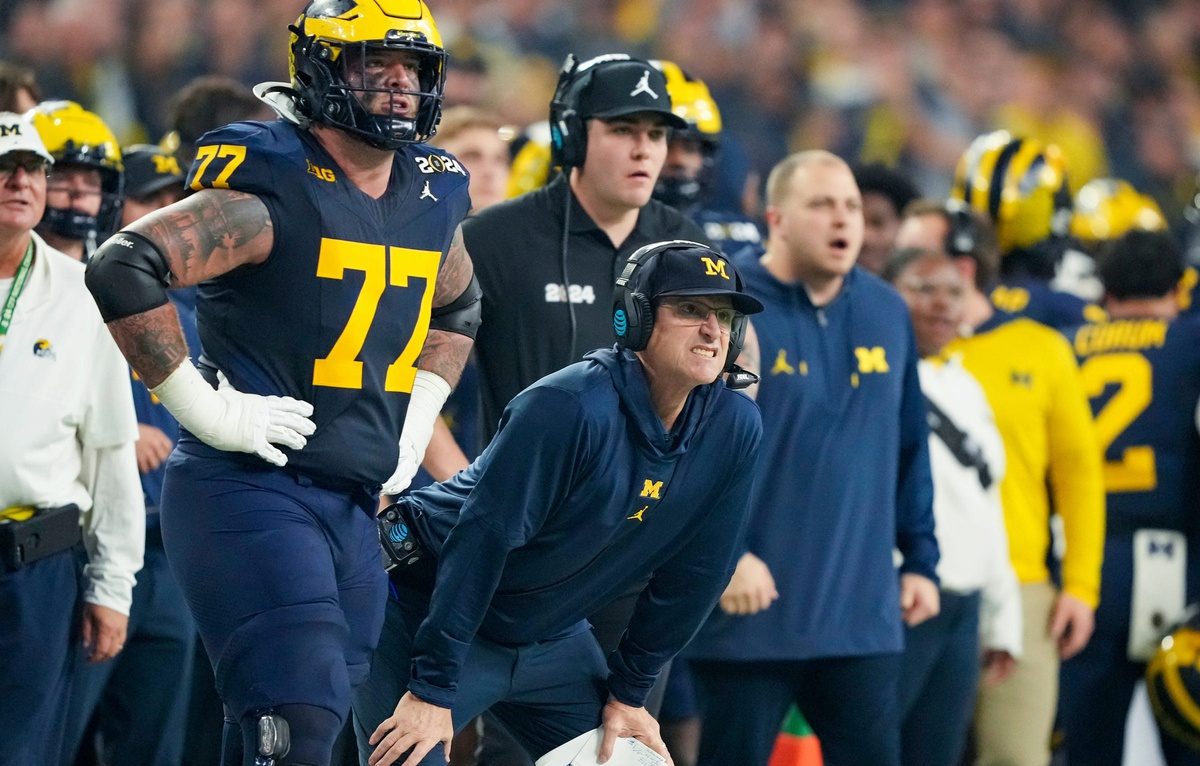Just a few years ago, it would have been unthinkable that a top college coach would endorse ideas like sharing revenue with athletes and allowing them to unionize. But this week, Michigan head coach Jim Harbaugh endorsed them and on the biggest stage in college sports.
The championship-winning coach took multiple opportunities during the College Football Playoff, including during his post-championship presser, to advocate for paying players and allowing them to unionize.
“The thing I would change about college football is to let the talent share in the ever-increasing revenues,” Harbaugh told reporters on Tuesday after winning the national title. “We’re all robbing the same train.” He went after his own benefactors, saying that the NCAA, conferences, and schools hire “armies” of “tall-building lawyers” to protect their positions against paying players. Harbaugh then endorsed athlete unionization, a concept the NCAA has opposed for years since it would require athletes to be considered employees. Harbaugh told the players sitting beside him that unionization was the next step. “There’s no voice for the student-athletes right now, and it just needs to change.”
The comments reflect a shift in public opinion: The NCAA and administrators can no longer dismiss these views as fringe. At the same time, how he used the most mainstream status quo platform of the CFP to amplify his message could influence other coaches to do the same. (Harbaugh also appears to be unafraid of upsetting those “tall-building lawyers,” who will likely have to confront his comments in court.)
“For him to come out and say it’s time for the players to unionize—for the coach who just won the national championship to say that is striking,” Jason Stahl, executive director of the College Football Players Association, tells Front Office Sports. “And I commend him for it.” Stahl added that “there’s a reason” other coaches don’t speak out against the status quo anytime, let alone on game days.
Maybe, as some internet critics have suggested, Harbaugh made these comments to distract from his other scandals related to recruiting and sign-stealing. Or maybe he’s already in trouble with the NCAA and doesn’t seem to mind upsetting them more. The rumors swirling about a future in the NFL have even factored in, with some suggesting that his imminent departure from college football allows him to speak freely.
But Harbaugh has been talking about paying the players all season—he’s even said he would take a pay cut to help facilitate. In fact, he’s been saying it in the locker room for years. “He’s always held that belief,” former Michigan fullback Jared Wangler, who played for Harbaugh during some of his earlier years at the helm of the Wolverines, tells Front Office Sports. “He’s now expressing it more.”
And he isn’t alone. Other coaches have advocated for forms of athlete revenue sharing or player organizing efforts. Multiple lawsuits around the country and two National Labor Relations Board cases have advocated for various types of athlete unions, salaries, and employee status. And just last month, NCAA President Charlie Baker proposed a new system by which players at the richest schools could receive money through a trust fund (though he has since reiterated that he doesn’t believe athletes should be considered employees).
Stahl, for his part, hopes that Harbaugh takes action. The championship coach appears at least willing to continue the conversation—when asked by reporters if he’d be willing to chat with NCAA stakeholders, he said, “I think they know my number.”







![[Subscription Customers Only] Jun 15, 2025; Seattle, Washington, USA; Botafogo owner John Textor inside the stadium before the match during a group stage match of the 2025 FIFA Club World Cup at Lumen Field.](https://frontofficesports.com/wp-content/uploads/2026/02/USATSI_26465842_168416386_lowres-scaled.jpg?quality=100&w=1024)
![[Subscription Customers Only] Jul 13, 2025; East Rutherford, New Jersey, USA; Chelsea FC midfielder Cole Palmer (10) celebrates winning the final of the 2025 FIFA Club World Cup at MetLife Stadium](https://frontofficesports.com/wp-content/uploads/2026/02/USATSI_26636703-scaled-e1770932227605.jpg?quality=100&w=1024)








